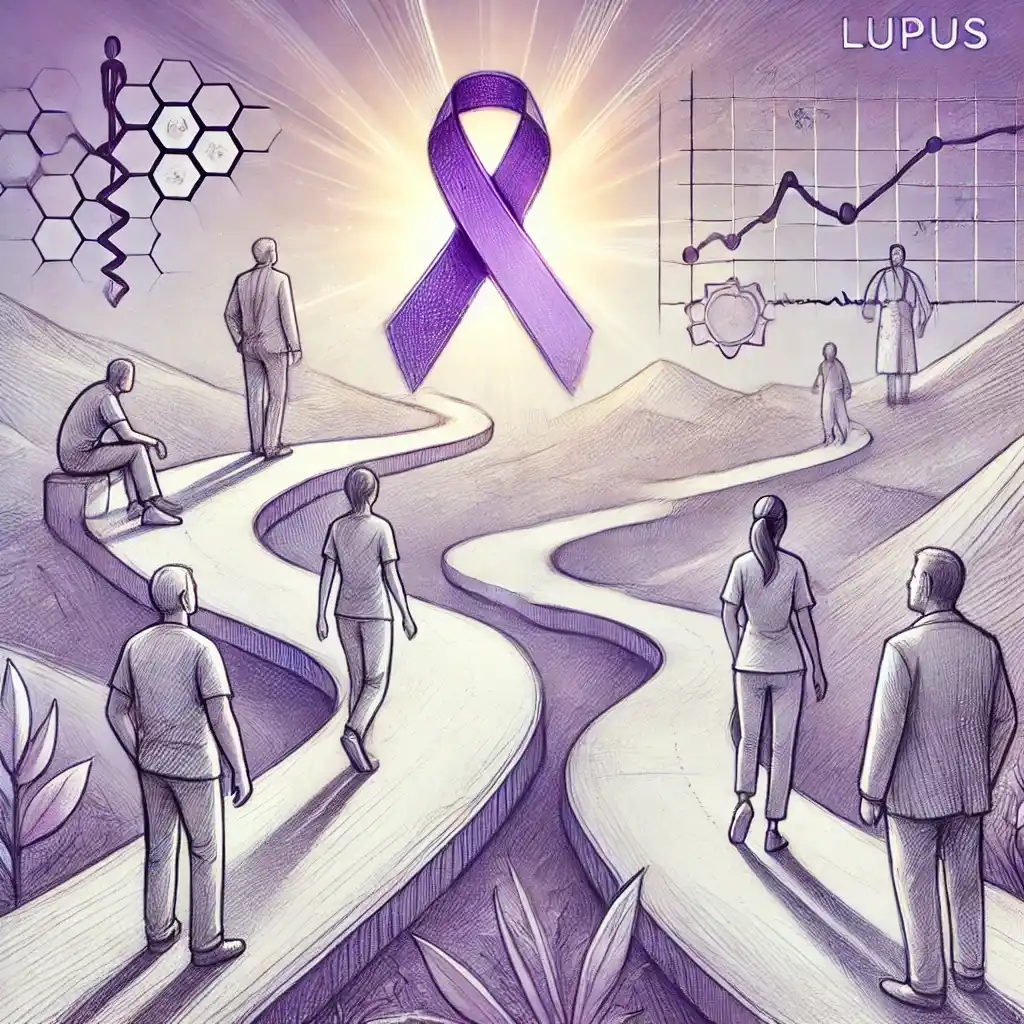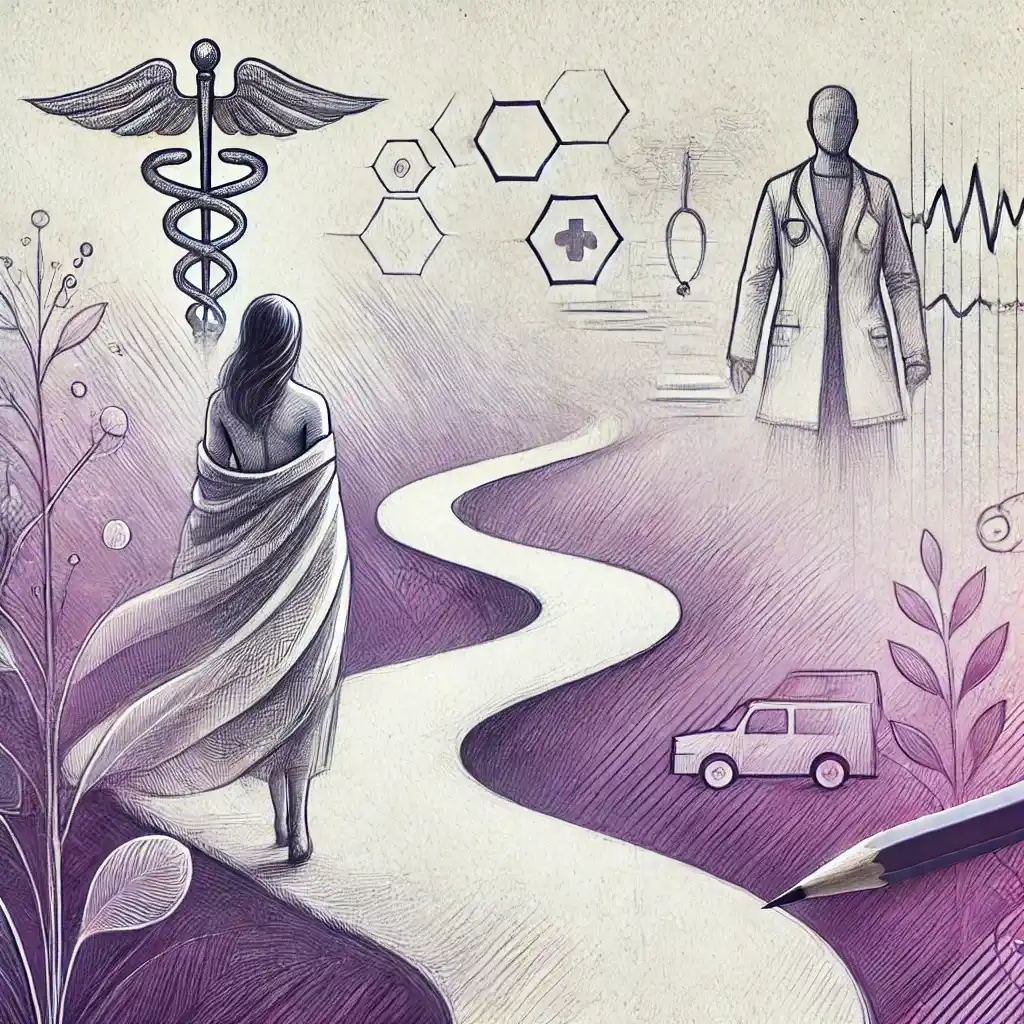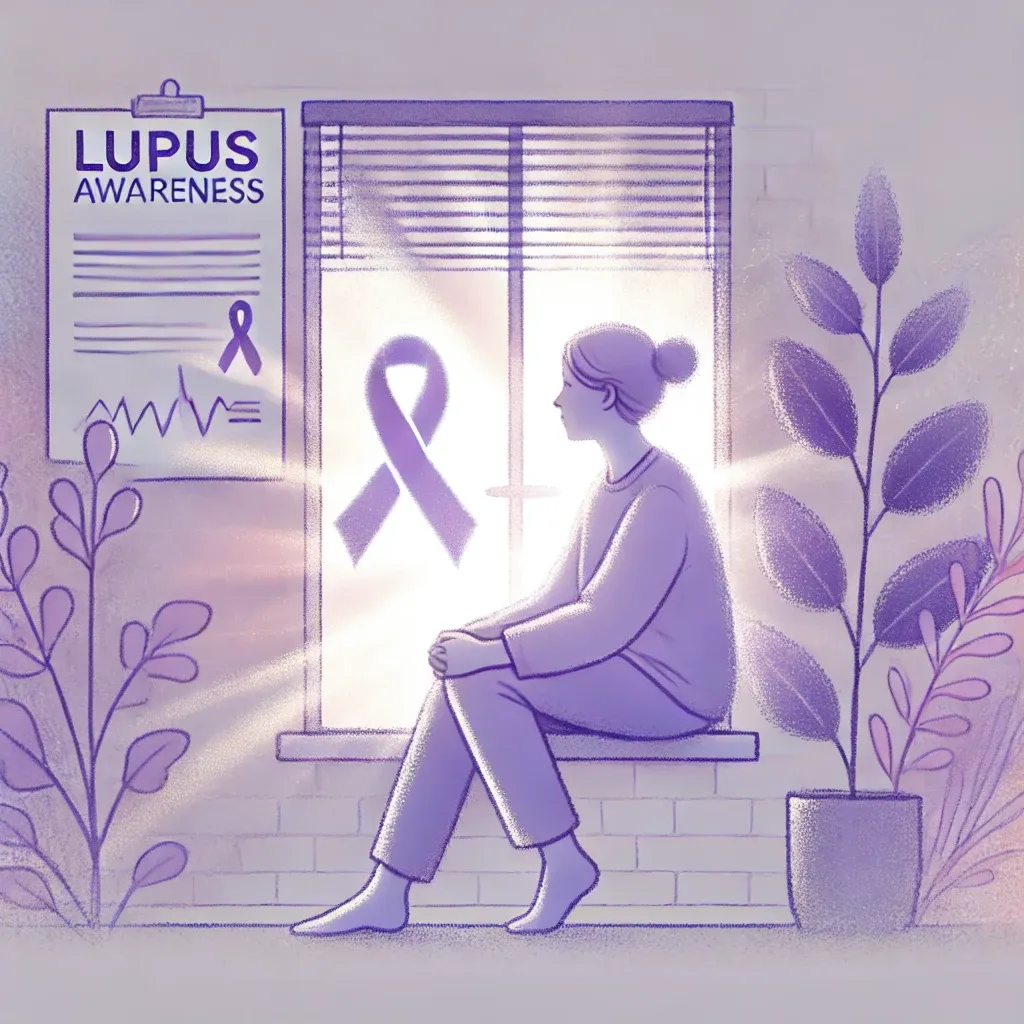Our Stories of Resilience
Discover the Journeys of Courage and Hope
Join us as we delve into the powerful stories of individuals living with Lupus, sharing their battles, breakthroughs, and the unwavering spirit that drives them forward.
Challenges, Acceptance, and Moving Forward
My Journey to Diagnosis: Navigating Lupus, Long COVID, and a New Reality
I have been lucky in that my diagnosis was quite quick. The advantage of having strong painful symptoms and by chance living in a good postcode lottery NHS area, meant my struggle was a lot shorter than many people’s.
When I look back, there may be symptoms and ailments in my past which might have been a clue, but it really is impossible to say. Both my Mum and one of my siblings had/have an auto-immune disease and whilst it isn’t always agreed that hereditary factors play a part, I don’t think it can be ignored. I am not a big sun lover; way too pale and it has always made me feel exhausted. I spent a month in Thailand decades ago when I didn’t eat any tomatoes or drink any orange juice and when I came home my body really rebelled against these. (So this may well be a histamine thing).
Still, who knows?! But back to the much more recent past…
A couple of years ago, back in the January, I had what I thought might be a few arthritis style twinges in one of my hands and wrists. I was referred to musco -skeletal who believed this maybe Carpel Tunnel and gave me a splint to wear at night. This didn’t help and actually seemed to make the pain worse. It would usually be worse in the morning and slowly reduce as the day wore on. As the pain was not that regular, once the warmer weather came, I forgot about it.
Then in the July of the same year I caught COVID-19. We were well into being around COVID by then as a nation/world. It had reared its ugly head over 2 years before. I was lucky, my dose was pretty mild and I remembered to take it easy after for at least 2 weeks as I had read that overdoing it within this period of time, even once it had cleared, could make you more likely to end up with Long COVID (LC). However, it didn’t stop me getting LC.
Looking back now I realise that that summer I was lacking in energy and from September onwards I became more and more tired and exhausted at work. So much so that the fatigue meant I went to bed as soon as I got home each evening. I began to get incredible pain in my forearms, wrists, fingers and sometimes up to my shoulders. I was often in tears in the morning trying to get dressed and had to get help putting on clothes.
My Carpel Tunnel consultant referral came through for early November and I was told that I did not have CT but likely a form of arthritis. My GP put in an urgent referral to Rheumatology for me, explaining this meant I should get an appointment in 2 weeks rather than the usual 4. I realise now how incredible this is, when some people wait 12-18 months for their first appointment with a rheumatologist.
So, late November I had my appointment at RSCH. I cannot fault the diligence and detail of the rheumatologist. My history was taken, I was examined thoroughly, sent for blood tests, x-rays and more beyond this first day. Only when I got home after this first day of testing was I told to go back in immediately as my platelet count was very low. It turned out I had ITP which was dealt with by Haematology with steroids and IVIG.
In late December, my Rheumatologist rang me one evening to say the blood test results which had had to be sent away to a lab further afield than RSCH, had come back and she believed I had Lupus. I knew nothing about it at that point, but she seemed calm, so I remained calm. I was told to keep taking the steroids and when I had my next rheumatology appointment in January I was put on Methotrexate and Hydroxychloroquine.
These two both mildly helped with the fatigue, which had become crippling by this stage. I had not been in work since mid-November.
I have had to give up work and have since been diagnosed with chronic fatigue syndrome (CFS) alongside Lupus and Arthritis. I had issues with my liver, which were believed to be Lupus-induced and they, mostly, seem to have calmed down now.
I feel reassured that I have had thorough checks of my liver, lungs, heart, kidneys, neck, skin, eyes and probably more that I have forgotten. I am lucky that the Lupus seems to have been caught quite early and doesn’t appear to be attacking any of my organs. I don’t have classic symptoms such as skin rashes but have a clearly always (now) high dsDNA result alongside the Serum C3 and C4 markers. I am still working out who I am now that I am no longer defined to a large extent by my work, which I had loved. I can’t do anything like the amount that I used to – I just don’t have the energy. And if I attempt too much it puts me out of action for days and days afterwards.
It is hard to tell which of my symptoms are linked to Lupus and which to other ailments, but I think this is often the way. People with Lupus seem to regularly have lots else going on. When I was first being diagnosed this all freaked me out. I wanted ‘answers’ to reassure me, and every time I went to see someone something else ‘wrong’ was being added to the list. My Long COVID likely prompted my auto-immune diseases. But this isn’t the focus now; the focus is on treating and monitoring the Lupus and other issues.
It definitely all feels incredibly overwhelming at the start and can take an immense toll on your mental health as well as physical. If I was to talk to myself as me now, to me then when I was first ill, I would try and reassure me, calm me down and tell me to “trust the process”. Even when in agony, results and decisions can’t always be made quickly. Investigations take time, as do medications to work their wonders. As I said, I was lucky to be diagnosed so quickly and to have a really responsive experience with Rheumatology.
When you’re in incredible pain it is unbelievably hard to feel strong, resilient or hopeful. But things have got better for me. I will never be the person I was before I had Lupus, but I also now realise that we all evolve and change throughout our lives, and this is my next ‘phase’. I have no choice but to accept it, so I shouldn’t waste precious energy trying to fight it. Of course I get low at times, but usually I can step out of this by going back to basics and expecting and appreciating small steps. I need to always consider cognitive efforts I make as well as physical, as both exhaust me and too much can send me into a flare. But it’s all ok and has helped me notice me a lot more than I used to.
Mystery symptoms & diagnosis
Story 2
Struggles, Diagnosis, and Adjusting to a New Normal – Living with Lupus: My Diagnosis and Experience
My Lupus journey started in December 2021. I woke up one day with such bad joint and muscle pain, I could barely move or get out of bed. I thought it was from clay pigeon shooting as I had gone the day before and knew it could cause a few aches but didn’t realise it would be that bad. I didn’t think much of it and carried on my days as normal. After 3 weeks, it wasn’t getting better, it was actually getting worse to the point where I couldn’t pick my phone up to turn my alarm off in the morning as my fingers hurt too much so I called the GP and explained my symptoms. I had stiffness and swelling in most of the joints in my legs, arms and hands. She asked if I’d recently had a cold and I did so they said it must be viral arthritis from the cold and it would only last 3 months. They hadn’t done any blood tests at that point.
About 2 months later, in February 2022, I started noticing some hair loss which got worse and worse until I had several bald patches on my head with the biggest one about the size of a tennis ball being on top of my scalp. This was such a sad and scary time as I did not know if I was going to lose all of my hair or whether it would grow back or not. I went back to the GP and she said I had Alopecia Areata and was told that there was nothing they could do except hope for the hair to grow back. I asked her to refer me to a dermatologist and they reluctantly did so whilst saying there was nothing much that they could do either. I asked if the joint pain and hair loss could be related and she said no but ordered some blood tests anyway. At the time, I didn’t really know what Lupus was so I didn’t research it but now I know that they are in fact important symptoms of Lupus. Another month went by and my joint pain was still there so I went back to the GP. I remember being unable to lift my arms due to shoulder pain and being unable to bend my elbows enough to touch my shoulders. The GP didn’t seem to believe me and bent my elbow so hard it caused me to yelp in pain. She then believed me and again, reluctantly referred me to the rheumatology department. This was around March/April 2022. She told me the waiting list was up to 2 years to see a rheumatologist but I had no choice but to wait. The blood test came back positive for antinuclear antibodies but she said it was not urgent and I should just wait for the referral to Rheumatology.
Over the summer, my joint pain got a little better. There was still pain and stiffness but I could do most things by myself. I had a dermatology appointment in September 2022 but they weren’t very helpful. They didn’t give me any information about Alopecia or mention any type of support or treatment but I didn’t mind too much as my hair was starting to grow back. I got most of my support from the Alopecia UK page on Facebook.
Then in late September, my joint pain started to get worse again. At this point, I had received an appointment letter for a Rheumatology appointment in January 2023. I thought great, only 4 months to go. It didn’t seem that long but my joints got worse and
worse. I wasn’t able to get dressed or shower by myself and was hobbling around everywhere. Then around November, I started getting little fevers here and there and I was starting to develop cold and flu symptoms. I also had 4 jobs at this point and didn’t have any days off in the week so I thought maybe I was overworking myself. Still had no clue that Lupus would even be in the question. I thought it was going to be rheumatoid arthritis. But I kept pushing through the busy Christmas period with the fevers getting higher and joint pain getting worse. And then they cancelled my appointment in January and moved it to end of February 2023.
On new years eve, I went to A&E with a high fever and what I thought was a chest infection. They put me on a drip for a few hours to help the fever, did a chest xray which was clear but gave me some antibiotics anyway and sent me home. Luckily one of my jobs had come to end as it was seasonal but I had to call in sick to the others as after a week, I still didn’t feel any better. I actually felt worse and had new symptoms of dizziness, headaches and breathlessness. My vision was also going blurry. I thought I was reacting badly to the antibiotics so I booked an emergency appointment with my GP who sent me back to A&E where the triage nurse told me that I felt bad because I had a high fever. I told them about the new symptoms and how I couldn’t sleep because I was so dizzy. They did lots of tests but no one seemed to know what was going on. They didn’t have any beds available so they gave me an injection for the dizziness, sent me home and told me to go to the Emergency Ambulatory Care Unit in the morning. I went to the EACU everyday for 5 days, meeting with different doctors, neurologists and rheumatologists all trying to figure out what was going on. That’s when one rheumatologist mentioned Lupus. I still didn’t really know what it was but they said to wait till my appointment in Feb to discuss it further.
This wait was the longest month of my life. I couldn’t get out of bed as I was so dizzy and fatigued. Whenever I tried to walk to the bathroom, my legs would start shaking from weakness. I couldn’t sleep because every time I closed my eyes, the room felt like it was shaking. I didn’t have any appetite and lost 7kg. I kept going back to the GP because the symptoms were getting worse but they had no idea what was going on. I was feeling so defeated but this doctor that I had only met less than a month ago told me that we were going to get to the bottom of this.
Then one morning early Feb, I was eating porridge and my mouth stopped moving whilst I was chewing. It was so strange. I tried to eat a banana and same thing happened. I couldn’t open my mouth properly either. I went to brush my teeth and half way through, my arms stopped moving. I thought surely my muscles aren’t that tired. I rang 111 and they sent ambulance on suspicion of stroke but I knew I didn’t have one. They took me in and kept me overnight and I saw a rheumatologist the next day who thought it was inflammation in my jaw from Lupus and started treatment straightaway. They kept coming for the next few days to do more tests and finally confirmed it was Lupus. Whilst
I was in hospital, my right eye turned 38° inwards which caused me to have double vision. This was due to inflammation which caused 6th nerve palsy. I started to feel a bit better after almost a week in hospital so I was allowed to go home. I finally went to my scheduled rheumatology appointment at the end of Feb where my rheumatologist went through everything very thoroughly and started a treatment plan. Throughout this whole ordeal, I don’t think I felt scared. I had no idea how serious this was and thought I just had a bad chest infection with arthritis. I knew I was going to feel better someday but just accepted being unwell at the time. I think I was too exhausted to feel anything.
Fast forward to September 2024, I’m feeling so much better. I am receiving treatment and responding well so far. Of course there are still bad days where my joints hurt, my brain is foggy and I’m exhausted. I have had to make adjustments in my daily living like sitting down in the shower or bringing a walking stick with me when I go out in case I need it and having to have a wheelchair for big days out. But I can live a fairly normal life, I still go out with my friends, ride my motorbike sometimes and can even do ballet and fitness classes some days. One of my colleagues who also has Lupus introduced me to the Lupus Support Group which has been amazing. We meet up and have a coffee and a chat every now and then and it’s so reassuring to know that you are not going through this alone. It has definitely been a journey and a half but I’m so grateful and lucky to have a good rheumatologist and a great support system at home too.
“Sharing my story with the Lupus Companions community has been a transformative experience. It’s comforting to know that I’m not alone and that my voice can help others find hope.”
“The stories shared here remind me of the strength we all possess. It’s a testament to the power of community and the importance of supporting one another through our journeys.”
“Reading these stories has given me a new perspective on living with Lupus. The courage and resilience of each individual is truly inspiring.”
“Being part of this community has been a lifeline. The shared experiences and support make the journey with Lupus a little less daunting.”
Support Resources for Living with Lupus
- Lupus Foundation of America: Comprehensive support and resources for patients and families.
- Local Lupus Support Groups: Connect with others in your area for shared experiences and support.
- Online Lupus Communities: Join forums and social media groups for advice and camaraderie.
- National Institute of Arthritis and Musculoskeletal and Skin Diseases: Access the latest research and treatment options.
- Patient Advocacy Organizations: Learn about your rights and how to advocate for your health needs.
- Wellness Workshops: Participate in sessions focused on mental health, nutrition, and exercise for Lupus management.
- Chronic Illness Support Networks: Broaden your support system with groups for various chronic conditions.
- Educational Webinars: Stay informed with expert-led discussions on Lupus care and advancements.
- Healthcare Provider Directories: Find specialists experienced in treating Lupus near you.
- Financial Assistance Programs: Explore options to help manage the cost of treatment and medication.
- Mindfulness and Meditation Classes: Techniques to reduce stress and improve quality of life.
- Peer Mentorship Programs: Connect with someone who understands your journey for personalized support.
- Community Health Centers: Access affordable healthcare services and support.
- Volunteer Opportunities: Engage with the Lupus community and make a difference.
- Resource Libraries: Access books, articles, and videos about living with Lupus.
- Family and Caregiver Support: Resources to help loved ones understand and support your journey.
- Exercise and Physical Therapy Programs: Tailored activities to maintain mobility and strength.
- Nutrition and Diet Planning: Guidance on dietary choices to help manage symptoms.



